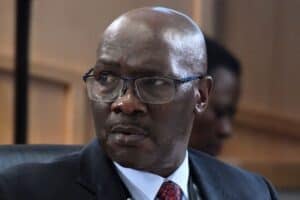Modise's support was not the first from a member of the South African parliament.

Speaker of the National Assembly Thandi Modise has reiterated South Africa’s support in the lifting of economic sanctions against Zimbabwe.
“We stand as South Africa to say to our brothers, our sisters, our neighbours – in fact our family because we have intermarried, to say that your pain is our pain,” Modise said at the 46th Plenary Assembly Session of the Southern African Development Community Parliamentary Forum (SADC-PF) on Sunday.
Modise was showing support for a motion by an MP from Angola, Josefina Perpétua Pitra Diakite, calling for the lifting of the economic sanctions imposed on Zimbabwe.
“Economic sanctions affected negatively people’s livelihoods, economic development and access to health, particularly the poorest and most vulnerable population, including young girls, women, children, the disabled and the elderly people,” Diakite said in her motion.
“The economic sanctions are a violation of the human, economic and social rights of the people of Zimbabwe and have a negative impact on the government’s efforts to leverage the economy and boost the living standards of the Zimbabwean people,” she added.
ALSO READ: PICS: Aid agencies throw lifeline to hungry Zimbabweans
The Angolan MP further expressed concern over the sanctions having “an adverse effect on the SADC region’s growth and sustainable development objectives and will slow down the economic and regional integration efforts as they undermine commercial, economic and financial relations between member states”.
The 46th Plenary Assembly Session of the SADC-PF, which was held in Swakopmund, Namibia, concluded on Monday.
Modise’s support was not the first from a member of the South African parliament.
National Council of Provinces Chairperson Amos Masondo tabled a motion at the 3rd Ordinary Session of the Pan African Parliament (PAP) in October, urging members of the PAP to demand the immediate lifting of the economic sanctions imposed on Zimbabwe.
In addition, former minister of international relations and cooperation Lindiwe Sisulu in February called on the European Union (EU) to give the Zimbabwean government and its people a chance to start afresh.
The EU imposed sanctions on Zimbabwe in 2000 – during a protracted period of land reform – after former president Robert Mugabe was accused of trampling on human rights, rigging elections and repressing press freedom – accusations that he had denied.
The sanctions resulted in economic challenges in the country with an 85% unemployment rate.
Sanctions were extended after allegations that President Emmerson Mnangagwa’s administration deployed soldiers to fire live ammunition at unarmed protesters, followed by a series of alleged human rights abuses.
Sisulu in her call cited concern over how the imposed sanctions would affect Zimbabwe’s chances at addressing its economic challenges.
“Without lifting the sanctions, the government of Zimbabwe will never be able to address its economic challenges and this is compromising the political gains achieved since the coming in of the new president,” she previously said ahead of a bi-national meeting in March.
The country recently held mass protests in October against the sanctions imposed by the United States and the European Union.
For more news your way, download The Citizen’s app for iOS and Android.






